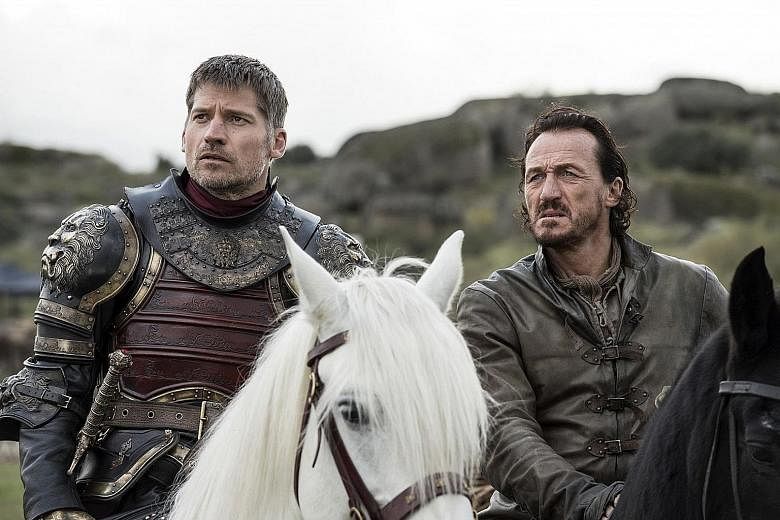NEW YORK • HBO should be riding high.
It just aired the fifth episode of the penultimate season of Game Of Thrones on Sunday night, a week after the previous episode delivered the series' highest ratings ever. The Emmy Awards are a month away, and HBO is primed for another big night after leading all competitors in nominations for a 17th consecutive year.
And yet, the premium cable channel is confronting two major headaches that have turned what should be a triumphant summer into an exhausting one.
Roughly two weeks ago, a hacker began releasing material stolen from HBO in a cyberattack. On Sunday, another wave of material was released, including unaired episodes of two anticipated fall series, Curb Your Enthusiasm and The Deuce. Though the material that has come out so far has not been damaging to HBO - there have been no embarrassing e-mails like in the attack that hit Sony in 2014 - it has certainly been an irritant that has shown no sign of fading.
And this weekend's deadly rallies in Charlottesville, Virginia, also served to remind HBO that the public outcry over its recent announcement of a new alternate-history drama called Confederate may linger for some time.
All of this is happening as HBO's parent company, Time Warner, is on the brink of a merger with AT&T.
The storm surrounding Confederate started shortly after HBO announced in mid-July that the next project from Game Of Thrones creators D.B. Weiss and David Benioff would be an alternate history drama in which the South successfully seceded during the Civil War, and government-sanctioned slavery was still a reality.
A backlash emerged, with some accusing HBO of being cavalier with the topic of slavery and the contemporary plight of black life in the United States. A social media campaign built around the hashtag #NoConfederate began trending on Twitter.
Several prominent writers denounced the series, including Ta-Nehisi Coates, who wrote in The Atlantic this month: "African Americans do not need science fiction, or really any fiction, to tell them that 'history is still with us'. It's right outside our door. It's in our politics. It's on our networks."
Then came this weekend's events in Charlottesville, where a rally of white nationalists turned into a series of melees and a 32-year-old woman was killed when a car sped into a crowd of counterprotesters.
One of the creators of the #NoConfederate campaign, Ms April Reign, who also created the #OscarsSoWhite social media campaign, said that the events over the weekend were a reminder that "we have not fully reconciled what the Confederacy means". "How is this an alt-history when we have things like Charlottesville playing out?" she said in a telephone interview.
HBO defended the series in a statement on Monday.
"We support everybody's right to express an opinion, but the suggestion of irresponsibility on our part is simply undeserved," the network said. "HBO has a long history of championing intelligent storytelling and we will approach this project with the same level of thoughtfulness that has always defined our programming. We recognise the sensitivity of this project and will treat it with the respect that it deserves. Our creative partners should be given time to develop the series rather than face prejudgment."
The backlash to the show has also spurred a debate about whether the #NoConfederate campaign constituted a form of censorship, because the criticism of the show developed before a script was even written.
Judd Apatow, the television and movie producer, said on Twitter that "to criticise work before it exists is dangerous to all expression". HBO said that Confederate would not go into production until Game Of Thrones was finished next year, meaning that it will probably be at least two years before the show is ready to air.
HBO has said that it did not believe its e-mail system "as a whole" had been breached, though the hacker, who refers to himself as Smith, has had access to some e-mails and released a number from the account of one network executive.
The information released from the Sony theft was eventually made available on WikiLeaks, making private e-mails easily searchable by the public.
In contrast, the HBO hacker has primarily released the material to members of the news media and it is not clear how widely some of the hacked episodes have actually spread online. Further, the hacker has not released any upcoming episodes of Game Of Thrones, HBO's crown jewel, which has two episodes left this season.
Smith has said he wants HBO to pay him a ransom for the rest of the material. On Monday, the hacker provided a copy of a letter that he had purportedly sent to HBO. "You disappointed us, so we will bring down your nasty empire," it read.
HBO said in a statement that it was no longer in communication with the hacker and that it would not comment on every bit of material that was released.
NYTIMES

